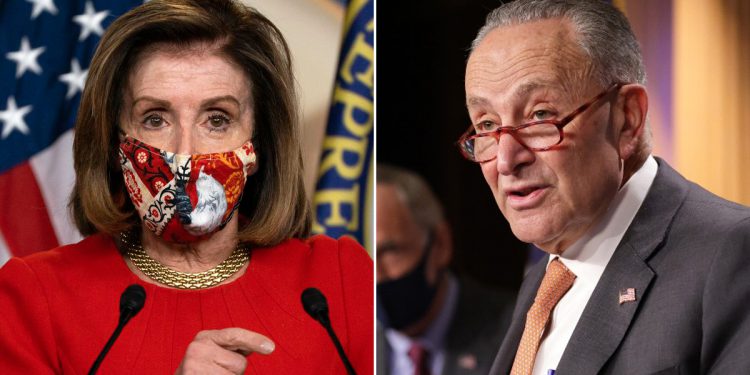Senate Democratic leader Chuck Schumer and House Speaker Nancy Pelosi have rejected the White House’s $916 billion COVID-19 stimulus package plan, which included $600 direct payments to millions of Americans, citing an “unacceptable” reduction in unemployment insurance funds.
Senate Majority Leader Mitch McConnell (R-KY) and House Minority Leader Kevin McCarthy (R-CA) had reportedly informed the Trump administration on Tuesday that they support the $600 checks.
“While it is progress that [GOP] Leader [Mitch] McConnell has signed off on a $916 billion offer that is based off of the bipartisan framework, the president’s proposal must not be allowed to obstruct the bipartisan congressional talks that are underway,” the Democratic leaders said in a joint statement.
“Members of the House and Senate have been engaged in good-faith negotiations and continue to make progress. The bipartisan talks are the best hope for a bipartisan solution,” the leaders added. “The President’s proposal starts by cutting the unemployment insurance proposal being discussed by bipartisan members of the House and Senate from $180 billion to $40 billion. That is unacceptable.”
McCarthy said he and McConnell backed the stimulus checks included in the White House’s $916 billion compromise measure, Axios reported on Wednesday. The liberal political website said the inclusion of the checks was discussed Tuesday among McCarthy, McConnell, Treasury Secretary Steven Mnuchin, and White House chief of staff Mark Meadows.
McConnell had opposed the checks for Americans previously and did not include them in a framework he released last week.
Meanwhile, a bipartisan group of senators last week introduced $908 billion in COVID-19 relief, but that bill did not include checks for Americans.
That bill would deliver another $160 billion to states and cities and $180 billion for unemployment insurance, two issues Democrats have pushed hard. The unemployment benefits would pay $300 per week for 18 weeks, retroactive to Dec. 1, which is half of what was included in the CARES Act passed in March.
The proposal would also set aside $288 billion for assistance to small businesses via the Paycheck Protection Program. In addition, the bill would free up $45 billion for transportation-related industries such as airlines and $16 billion for development of a COVID-19 vaccine development. Another $182 billion would be used for healthcare provider relief fund, education, student loans, housing assistance, nutrition, and agriculture programs and the U.S. Postal Service.
Under the first stimulus bill Congress passed in March, individuals were eligible for payments up to $1,200, but that amount declined for those with an adjusted gross income higher than $75,000 a year. The $1,200 payment dropped by 5% of every dollar above $75,000, or $50 for every $1,000. The benefit didn’t apply to individuals with incomes over $99,000.
Married couples with combined incomes up to $150,000 were eligible to receive $2,400, subject to the same phaseout that applied to individuals. The payments phased out entirely for couples making $198,000 or more. Families also got $500 per dependent child under the age of 16.
Approximately 120 million U.S. taxpayers qualified for direct payments from the federal government under the bill. But since then, Congress has offered no aid to Americans, only businesses and state and local governments.
 Telegram is where we really talk. Don't miss out!
Telegram is where we really talk. Don't miss out!








